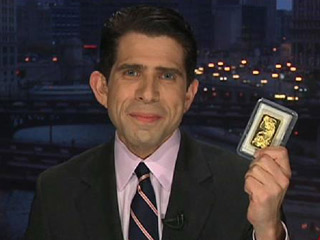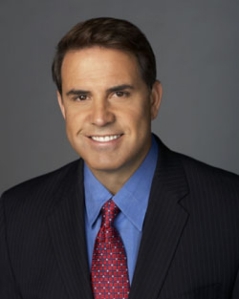The Gold Bugs May Be Right This Time

I’ve generally regarded gold bugs, that is, investors perpetually bullish on gold as an investment as somewhere out on the fringe. They tend in the popular mind to be associated with eccentric people living in the wilderness, their concrete bunkers filled with ammunition and beef jerky.
But no more.
Maybe the gold bugs are right this time. They’re everywhere: advertising on the “Glenn Beck Program” and all over TV and radio — and they’re doing this for a reason. People are beginning to grasp the economic catastrophe –apparently planned by the Obama administration— that still awaits America and the rest of the world.
U.S. policymakers have ramped up the money supply so dramatically and so rapidly that it seems impossible at this point to avoid nasty hyperinflation. America may not experience hyperinflation as severe as anything seen in Weimar Germany, Zimbabwe, or Brazil, but by American standards it is going to be awful.
Beck noted on a previous show that a massive increase in the money supply takes roughly two years to cause inflation or hyperinflation in the economy. In the 1970s the government printed money like crazy and added 13% more to the money supply over two years. This caused an inflation rate of 12%. The Federal Reserve chairman at the time, Paul Volcker, had to raise interest rates in order to stem inflation. He raised interest rates to 20%.
But, Beck noted, the money supply in the U.S. has been increased by 120% in the last year or so in order to meet the impossible demands of a reckless president and Congress. It certainly seems to resemble the Cloward-Piven Strategy of orchestrated crisis applied on a grand scale.
To what heights will our interest rates have to rise in order to tame the inflation that is about to be unleashed? Will those brutal interest rates snuff out economic growth? America is going to find out.
Jonathan Hoenig of Capitalist Pig Asset Management (pictured above) said on Beck’s TV show that
“as more and more people are dumping the dollar these days, they’re turning to gold as a store of wealth, which is exactly what’s pushing it, as you pointed out, to new all-time highs today.”
Gold has touched $1,100 per ounce in recent days.
As America’s reckless spending continues it prompts more foreign investors, including central banks– to dump their dollar holdings. Said Hoenig:
A dollar is a piece of paper and gold is a store of value. And, of course, that would go anywhere these days. So, that my gold, this is the hottest investment literally in the world right now. Gold is a store of value — it has been literally since Christ walked the Earth.
Comments are closed.




 Follow us on Twitter
Follow us on Twitter
































Again, a misunderstanding of what drives inflation and where the increase in money supply is coming from. The Fed buying Treasuries is simply converting overnight reserves into Treasuries – the Fed is buying bonds and increasing the amount of excess reserves in the banking system. This has no inflationary impact (apart from a psychological impact from articles like the above) as lending is not in any way reserve constrained. Banks do not make more loans when there is a greater amount of excess reserves or less loans when excess reerves fall.
The Fed will do what it has always done – it sets the rate and lets the quantity of reseves float in order to accomodate that desired overnight rate. It will sell Treasuries as it has always done to drain reserves and now will have the option of paying interest on reserves. If there is demand for loans then banks will weigh the risk adjusted income to be earned from lending vs what they can earn risk free from keeping their excess cash at the Fed and earing the overnight rate.
The presence of any amount of reserves is not inflationary.
If you think the economy is about to really take off you hvae a valid inflation concern. In the mean time the greater concern is deflation as agregate demand reamins very very weak and private sector deleveraging continues.
Inflation is defined as an increase in the money supply. End of story.
When the Fed buys government bonds it increases the money supply, the supply of credit or fiduciary money. We will see the consequence of that increase in the form of higher prices when the government begins to bid resources away from the private sector with the credit it received from the Fed.
A further consequence is that marginal producers will go under because of higher costs, and employees will lose their jobs. 10.3% anyone?
Inflation is always a monetary phenomenon and hyper inflation is a political phenomenon. Keep a close eye on the bill in the Senate that would give the Sec of Treasury veto power over the Fed.
When the world loses confidence in the dollar, rates on Treasuries will increase, thus driving rate changes through the economy.
Look at Iceland where they have massive unemployment and inflation. It is the government creation of money (out of thin air) to pay the welfare and unemployment benefits that is driving it.
Buy physical GOLD and SILVER now they are the only store of value that has NO counterpart risk. The Chinese government is actively encouraging their citizens to buy gold and silver, that alone should be enough to make you go out and buy some.
Anyone who is investing in gold either on paper or for in hand bullion is going to have it confiscated by Obama as hoarding just like FDR did in 1933. Beef Jerky, wheat, and bullets are the smart investments for a family man until the angry infant Lord of the Flies is gone in 2012.
Sean: You seem to be a knowledgeable guy and seem to present a coherent argument. However, I will stay with Beck and his ilk simply because the usual way of repaying debts is with the inflationary money which is of less value than the original borrowed money. Thus it is always the savers and investors who are screwed.
How would a gold standard help? The problem is that the banks are allowed to do what would be considered a crime if done by anyone else. You deposit $1000 in the bank and they lend it out to 10 people. Each person receives what amounts to a fraudulent receipt. As long as no one fails to repay the loan everything is fine. But if only one person who borrowed the $1000 fails to repay the money, the bank is broke. So the FDIC, that is the tax payer, comes to the rescue. Guess how much the FDIC will reimburse the bank? the 1000 borrowed? Not a chance. Since the bank is “broke” they get the full $10000. Why the banks don’t push people not to repay seems to be a mystery.
If the initial deposit was $1000 of gold instead of dollars nothing would change. The problem is that the entire banking system is a fraud. Right now all it does is inflate bubbles and create extreme wealth for the people who run the system. Think about the math. Let’s redo the 10 loan situation but this time with gold. If the bank holds 1000 dollars of gold and let’s say the bank has lent out 10000, or ten loans. If everyone repays the loan, at let’s say 10% then the bank makes 100% profit. Each person will pay $100 in interest, but the bank only has 1000 actual dollars. Not a bad return, even for a loanshark.
That’s the difference between gold and greenbacks. Gold is a physical commodity whereas greenbacks are a representation, an IOU, a promise. Back in the day, we had “silver certificates” that ensured that they could be traded for their face value of actual silver. Notice current greenbacks no longer say that. There is a finite amount of gold, therefore protecting it from hyperinflation. The drawback to that is, it limits the amount of trading you can do. Remember those old advertisements for dry goods from the late 1800’s? 5 pounds of flour 1c, pound of sugar 1c? 2 dollars a week was a good wage? that being said, remember, no government can make more gold to pay its debts. Not true for greenbacks. The US government has always made good on its promises? Oh, I guess that’s where the problem is. You people better handle this mess now, if you don’t, this monetization scheme is doomed to fail, it always has failed. Turn off the sitcoms. Stop waiting for your neighbors to handle it. The BIG question is whether or not it is deliberate. Also, if it all comes crashing down, will we have the guts to do the right thing and deal with the perpetraitors? Or, have we become a shadow of the people that founded this republic?
“The drawback to that is, it limits the amount of trading you can do.”
The gold standard does not limit the amount of trading you can do. It limit’s the amount of credit that can be created. If you don’t have the gold you can’t offer the credit.
I apologize for my lack of clarity. Yes, my point was there is a limit to the volume of business that can be performed using gold. Money that does not represent a commodity has no physical limitations.
Sorry to be a pain in the neck, but these issues are too important to not get right.
The only limit on the volume of business is the available capital (and labor). Credit creation does not ultimately expand the volume of business; it only reallocates the available capital.
Good point, Mik. As long as banks can print paper and call it money the problem isn’t solved. However, what people mean by the gold standard is that paper money is 100% redeemable in gold.
If that were the case then in your example as soon as someone with $1001 in paper demanded gold the bank would go belly up. Of course, way before that happened people would get wind of what the bank was up to, and there would be a run on the bank. Great fun that!
What is anything worth if you are not free to spend it.
“Inflation is defined as an increase in the money supply. End of story.”
Actually Inflation is an increase in the price of a good or service.
Can anyone give a coherent argument on why Japan is mired in deflation despite having the largest debt to GDP in the history of the industrialized world.
The BOJ instituted a 0 overnight rate and went beyond that by constantly adding enough overnight liquidity to ensure excess reserves stayed above JPY 30 trl – an unheard of amount. For years these excess reserves were availabe to be lent by the banks instead of sitting at the BOJ earning nothing. The BOJ and the MOF eventually realized that lending is not reserve constrained nor will an increase in reserves bring about inflation.
You can not neglect to look at velocity and without any lending the lower rates adn excess reserves will not enduce price pressures.
Original use of the concept of inflation was an increase of the money supply. The rise in prices is merely the consequence of inflation. To confuse the rise in prices with their cause is a convenient obfuscation of economics which benefits those who advocate Keynesian political policies.
While I am not familiar with the details of the Japanese economy, I suspect they are experiencing the bust end of an inflation induced boom. Inflation causes a misallocation of the factors of production. When prices ultimately reach a steady state the market reasserts itself, and those recipients of misallocated factors fail. They default on their debts and credit shrinks. The result is deflation.
“They default on their debts and credit shrinks. The result is deflation.”
And that is the central issue – without the extension of credit there is no inflation. An persitant increase in reserves held at the Fed is a manifestation of the contraction of prvate sector credit.
Yes, the Japanese are experiencing the bust of their asset price inflation – both equity and real estate but the bust has gone on for about 15 years now, with no inflation – in fact persistant deflation. We face much the same risk and a reduction in the federal deficit at this point would be a disaster.
I contend that the current policies are terrible but I would strongly warn againt any attempt to raise interest rates or balance the budget without fitsr seeing an increase in the demand for credit from the private sector.
I see this argument a lot. That model forgets one thing. The Japanese population is decreasing, rapidly. They won’t allow massive immigration and as an island there’s very little of the illegal variety as well. Result:fewer customers chasing a lot of product or deflation. The US is not in that position as the establishment’s actual position on immigration, legal and illegal is “full speed ahead!”. When the bad housing investments get cleaned out in 2011 or 2012, real estate prices in California will begin to rise again from population pressure alone. Combined with the inevitable energy price increases, food increases due to agro-fuel you’ll see lots of price increase with little salary change due to continued high unemployment. Lower standard of living all round with higher taxes due to health care and entitlements.
There wasn’t supposed to be “stagflation” in the 80s either, but it didn’t end until the money supply was stabilized.
K, If I understand you correctly you are saying that too few consumers bidding for too many goods resulted in deflation in Japan. So it didn’t matter what the BOJ did in terms of adding to excess reserves or the explosion in the broad money supply – it was an issue of too little agregate demand that drove inflation.
I contend the same for the US as we struggle through our private sector balance sheet repair and deleveraging.
I agree energy prices will rise as we have done nothing to address our supply problem ( in fact we are going the other way) and food prices will rise right along with them. These will be driven by incraeses in demand though, not by the fact that there are excess reserves that in fact get drained ever night as they go from the banks to the fed.
If money supply was the key, why has every central bank abandoned it as a guide to setting policy rates?
Just an aside on gold. If you bought in the last inflation fear inspired bull maret in the 70’s you will break even (adjusted for inflation) at $2300 so hang on, youre almost flat – just another $1200 to go.
Inquisitor, I would be happy to send you some research that you may find interesting. Some relatively light, albeit kind of depressing economic reading on the current recesson.
All the Best
Sean, I would be glad to receive the research which you are so kind as to offer. How do you propose to do that without disclosing our identities to potential crazies on the web?
thats a great que stion. lemme think about it…
Right now Gold is going up due to the devaluation of the dollar and inflation. Price indexes don’t include the price of housing. Housing tripled from 1998 to 2006 during the housing bubble. Inflation has been much higher than reported.
Hyperinflation won’t occur from the money supply, but from the perception of the US Government going bankrupt. Deflation or Inflation could cause this, assuming interest rates keep up with inflation. If the Federal Reserve continues to pay negative real interest rates, fewer and fewer investors will want the dollar. That’s what is driving the dollar down and Gold up. If people unload the dollar like stocks in the 1929 stock market crash, Gold would skyrocket. As the value of the dollar goes to zero, Gold goes to infinity.
The US can not go bankrupt – thats like saying the subway system can run out of tokens. Obviously peoles perceptions can be anything, regardless of the facts so I can’t argue that the perception isnt there.
I would also note that foreign central bank USD reserve accumulation belies the notion that the world is losing faith in the USD and caution not to read too much into a trade that is working very well for guys who are short USD. When this turns its going to be violent and you will see a huge USD rally. I think that will happen when the Fed signals that they are going to start raising rates.